Chinese volunteers in the Korean War
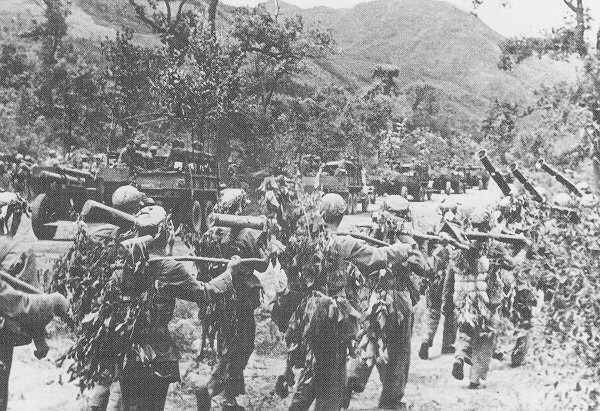
This year, at the end of July, exactly 60 years have elapsed since the day the war ended in Korea. We know very well that many volunteers from the Soviet Union participated in it, and we also know that Chinese volunteers also fought there, but what was their total number, how many died there, so it is still not known exactly.
The figures are available in the open press and they say that there were not just a lot of Chinese, but a lot of Chinese in the Korean War. It is also known that during that war in Korea, the Chinese suffered tremendous casualties, and that it was their volunteers who played the most decisive role in the fighting on the side of North Koreans against US and UN troops.
Chinese volunteers on the Korean Peninsula were not tens or even hundreds of thousands of fighters, but several million.
Information about the huge total number of volunteers is confirmed by information from the Chinese sources themselves. For example, Chinese information and news portal China.org.cn in 2010 published excerpts from an article written by Major General of the Chinese Army, Professor at the National University of Defense People’s Liberation Army of China, Xu Yan. This Chinese general claims that the number of Chinese soldiers who fought on the side of North Korea reached almost 3 million.
I quote literally:
"Xnumx, July Xinumx, Chinese Chinese million million million million million million million million
Translation:
“Xu said in the article that from October 1950 to July 1953, a total of 2.97 millions of Chinese soldiers fought in the war, which in China is known as a war against US aggression and helping Korea.”
If these figures are true, then it turns out that the number of Chinese volunteers in Korea was approximately equal to the number of all US forces that they numbered in the 1955 year. But even this number is probably greatly underestimated, since according to some estimates, only one loss of the Chinese in this war amounted to about a million people.
In particular, Andrei Kirilov, head of the ITAR-TASS office in China, writes about this in his article published on the Echo of the Planet website:
“The total losses of the parties in the Korean War amounted to, by some estimates, 2,5 million people. Of this number, roughly 1 million falls on the losses of the Chinese army. The North Korean army has lost half as much - about half a million people. The armed forces of South Korea missed about a quarter of a million people. The losses of the American troops amounted to 33 thousands killed and in 2 – 3 times the number of injured. The troops of other states that fought under the UN flag lost several thousand people. No less than 600 thousand people are killed and wounded civilians in North and South Korea "
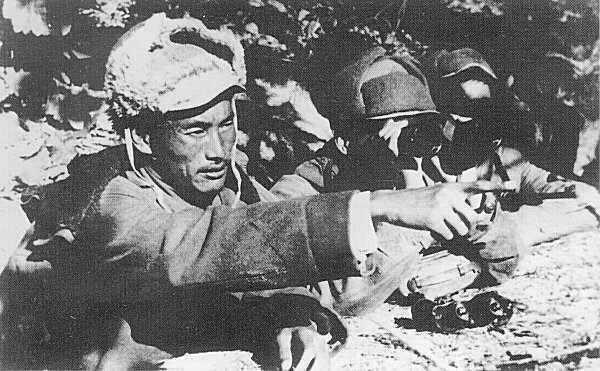
All Chinese volunteer units in Korea were consolidated into 25 army corps, into a huge grouping of ground forces, having high morale and willingness to die for the freedom of the fraternal Korean people, however, all this pedestrian Chinese army did not have enough even ordinary military equipment and light weapons.
It is known that the infantry divisions of the national volunteers were only 40-50% manned with artillery and mortars. tanks and artillery of large calibers. Also in the Chinese units there was a shortage of ammunition, communications and vehicles.
Even the North Korean army and that, compared with the Chinese, was equipped with equipment and weapons much better. In this connection, it is interesting to note that if the North Korean army was created and trained mainly on the Soviet model, the Chinese PLA bore the legacy of a civil war and in many respects remained partisan in its tactics precisely because of its lack of heavy weapons.
For example, if the North Korean division had about 200 machines on its armament, then the Chinese had none. If in the North Korean division there were about 40 artillery shells, then in the Chinese there were only 9 light howitzers.
North Koreans had 4 times more machine guns and anti-tank weapons. But then the Chinese had more light machine guns and light mortars, which could easily be carried on their hands.
Shortly after some hesitation (there was such a thing), the PRC leadership finally decided to start sending its troops to Korea, on the night of October 19, 1950, on the very day when American troops occupied Pyongyang, the main forces of Chinese troops began crossing the Yalujiang border river .
The commander of the Chinese people's volunteer troops Peng Dehuai informed Kim Il Sung that under his command there are 12 divisions, which are divided into four armies, as well as three artillery divisions. The total number of Chinese troops numbered - 260 thousand people.
In the second echelon - two armies, 80 number of thousands of people. According to the plans, with the introduction of second and third echelons to Korea, the total number of Chinese troops was to reach 600 thousand people.
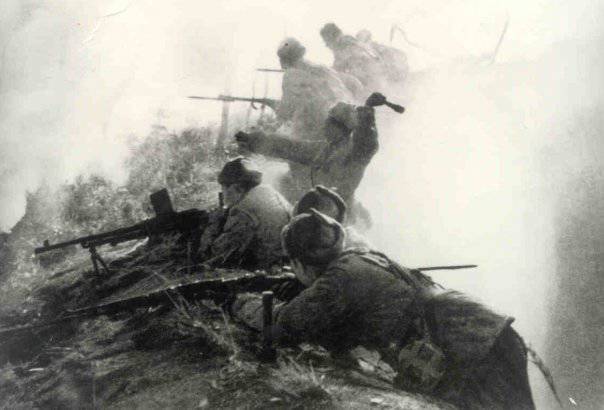
Entry of Chinese associations and connections was carried out from three directions. The 40 Army, the main forces of the 39 Army, and the 1 Artillery Division comprised one faction that forced the Amnokgan (Yalu Jiang) River from the Andong area. The 117 Division of the 39 Army, the 2 Division of artillery from the anti-aircraft artillery regiment advanced from the mouth of the Changzingan River.
The third grouping in the 38 and 42 armies, the 8 artillery division, forced Amnokgan and entered the territory of Korea from the Tszyan area.
The Chinese operation to bring troops into Korea and to concentrate in the designated areas as a whole ended in complete success. American intelligence, up to October 25, did not know about the movement of a huge group of Chinese troops deep into North Korea. On that day, in the western sector of the front, the 118-I Chinese division of the 40 Army attacked the 6-South Korean Infantry Division, which suffered heavy losses.
The first military clash between the Chinese and the American forces took place on November 2 1950, when the 8 th regiment of the 1 th Cavalry Division of the US Army engaged the vanguard of the 39 th Chinese army in the Unsana region.
At its core, the Chinese army of volunteers was a lightly armed force capable of infiltrating through the enemy’s battle formations thanks to the skillful use of natural terrain in the area of combat operations.
Interestingly, for the first time, the classical logistic support for such troops was not required, since the volunteer soldiers were unpretentious in everyday life and ate mainly at the expense of provisions carried on themselves, requisitioned from the local population or harvested in the surrounding forests.
So, for example, the Chinese soldier needed just 8 - 10 pounds of equipment a day, while the UN soldier consumed 60 pounds.
In general, the Chinese division also consumed about 10 times less than the American - because of its low motorization, a lower level of personal comfort of soldiers and low equipment with heavy weaponsIn other words, the Chinese did not need a lot of gasoline, shells and other material means.
As a result, the Chinese army was able to organize a network of porters who carried on their shoulders all food and ammunition. And they moved not only along the roads, but also along winding mountain trails, where the American aviation I could not get them. The Chinese often took advantage of the fact that the Americans always bombed the roads at about the same time, so using the template in the actions of enemy aircraft, they moved almost unhindered in the intervals between the bombings.
Yes, the Chinese were much easier to endure the war and could do without a lot, but this situation was rather forced. Many Chinese soldiers had only 80 ammunition and several hand grenades in their ammunition. They did not have winter uniforms, and they were shod in their famous Chinese sneakers.
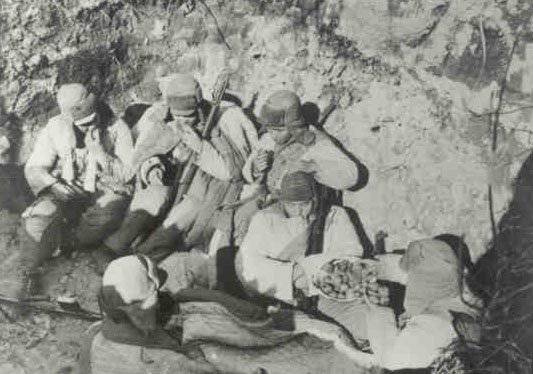
As a result, because of the constant aerial bombardments, Chinese and North Korean soldiers did not have reliable shelter over their heads and often suffered heavy losses not only from enemy fire, but also from typhoid, frostbite and gangrene.
If the mobilization resources of the DPRK were rather limited, then China, on the contrary, had an almost unlimited supply of "manpower" and therefore the PLA command didn’t spare their fighters in that war, threw dry firewood into the battle. In this case, it should be noted, and a high level of motivation of Chinese troops. If the American policy of avoiding losses and technical superiority often led to the fact that, without being able to achieve an easy victory, the Americans preferred to retreat and take care of their people, then PLA fighters could follow the rupture of mines and shells of their artillery preparation, but here, occupy the occupied territory and dig in on it.
Offensive actions were considered the main and decisive type of hostilities of the Chinese volunteer troops, while the Chinese always paid special attention to the first battle. The first battle, in their opinion, must be won, therefore, as soon as the order was given, the Chinese commanders tried to bring it to life at any cost, even if it was obviously impracticable, and it came down to aimless body throwing.
Soon the Americans and their allies felt for themselves all the delights of partisan tactics of unpretentious Chinese, the essence of which was reduced to the principle of "win at any cost"
During the offensive, the PLA volunteers began to actively use their most favorite method of combat, this trickle down and encirclement, which is why any position of the UN troops had to be strengthened for all 360 °, otherwise Allied soldiers could not live until morning, simply because the Chinese attacked at night or at night, due to which the American soldiers were forced, is in constant tension and rest, without even taking off their shoes.
Usually, the attacks began with a horn signal and continued to “the musical accompaniment of gongs, whistles and other sound means of transmitting commands, all of which were instruments of the Chinese volunteers instead of radio stations.
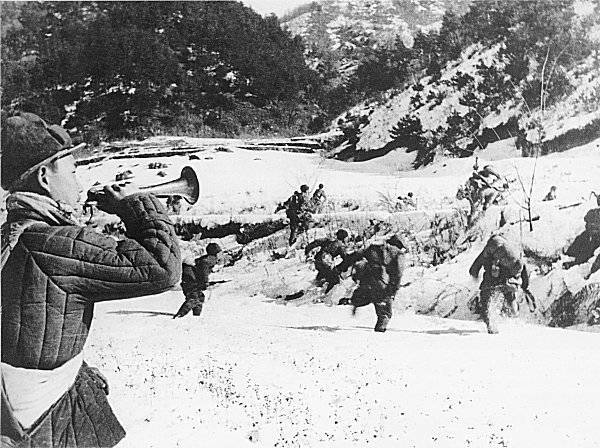
The nightly attacks exerted quite strong psychological pressure on the enemy and partly neutralized his heavy weapons — the defenders shot at “dark light” with a great risk of wasting ammunition.
The Chinese offensive on the Korean fronts is often associated with the well-known tactics of the so-called “human waves”, which is perceived by the ordinary man in the street as throwing the enemy with corpses and a massive run on his machine guns.
Here is how one of the episodes of this tactic is described:
“Chinese troops attacked in dense chains right along minefields, but their waves broke against American and South Korean fortifications. Therefore, the losses of the “Chinese people's volunteers” were many times greater than the losses of the enemy ”.
Other experts believe that in reality this was somewhat wrong. And that with the right organization of interaction, the advancing enemy bears quite commensurate losses.
In the absence of the best, those military formations that are not able to provide for the actions of their own infantry with heavy weapon fire will resort to it and will probably resort to it.
In Korea, this tactic was aimed at quickly entering the dead zone and being inaccessible to the fire of American artillery.
If the Chinese were able to be detained on wire barriers or otherwise, the UN forces, as a rule, were able to win at the expense of superiority in firepower.
If not, it affected the Chinese advantage in close combat — situations where UN troops won bayonet attacks were rare, and there were not so much the Americans as their allies, mostly the Turks and representatives of the countries of the British Commonwealth.

The last time the Chinese used similar tactics in 1979, in the war against Vietnam, and very poorly, the Vietnamese machine gunners literally hundreds of PLA human waves.
Not immediately, only after a thorough study of the experience of the first year of the war, the Americans finally developed their own special, quite competent countering tactics against the Chinese. In which they took into account, first of all, the lack of heavy weapons among Chinese volunteers and the problems associated with the supply of their parts by air. All this made the Chinese very vulnerable in the war of maneuver that they were trying to impose on the Americans.
The Americans now began to occupy, first of all, fortified heights, and at night they allowed the Chinese to seep and occupy the territory around them, and then destroy them the next day, using their superiority in the air and firepower.
The features of the Sino-American confrontation on the Korean fronts were most accurately expressed by military historian D. Rees, who noted that “the Korean war is an interesting example of a conflict in which one side successfully realized its advantage in firepower, and the other - superiority in manpower. "
It is also interesting to note that the Chinese veterans polled by historian M. Hastings argued that the Americans seemed to them a less serious opponent than the Japanese. According to them, the Americans lacked the will, and templates prevailed in their tactics.
Based on:
http://garry-71.livejournal.com/80297.html
http://www.milresource.ru/War-in-Korea-4-3.html
http://makkawity.livejournal.com/1451156.html
Information